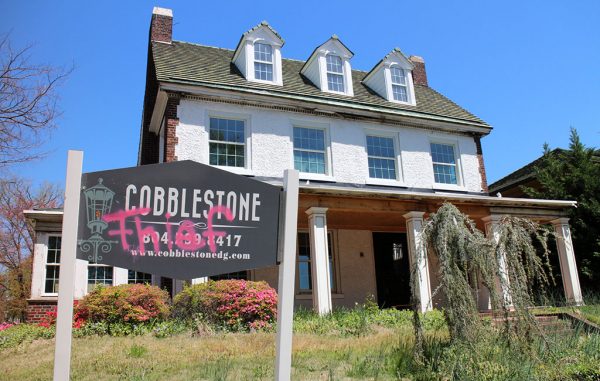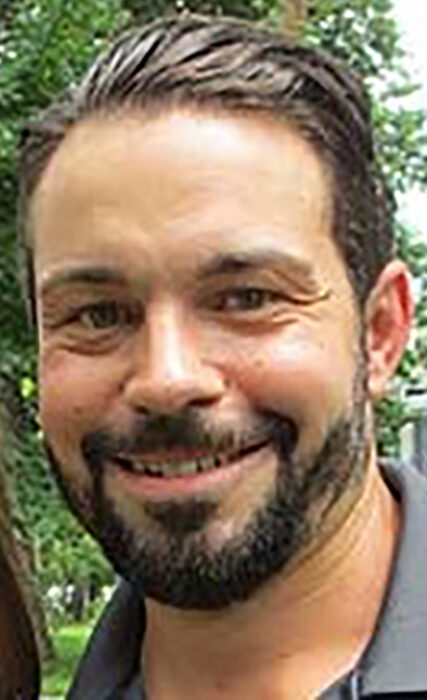
The federal courthouse in Richmond where the Passmore and Romano cases have played out. (BizSense file)
The former paralegal and key witness in the federal fraud case against once-prominent local house-flipper Josh Romano will serve more than a year in prison for her part in the scheme that defrauded one of Romano’s former lenders.
Lindsey Passmore was sentenced Wednesday to 14 months in prison and three years of supervised release for conspiring with Romano to defraud the lender by disbursing more than $1 million in funds for certain home rehab projects from escrow accounts without the lender’s authorization. The events occurred five years ago.
Passmore, 39, had pleaded guilty to a charge of conspiracy to commit wire fraud in an agreement with prosecutors in exchange for her cooperation and testimony in Romano’s trial last month. Assistant U.S. Attorney Michael Moore described Passmore’s testimony as central to the government’s case, in which Romano was found guilty on four counts of fraud and embezzlement charges and not guilty on three other counts.
In return for her testimony, and in light of circumstances in her personal and professional life, Moore had recommended a sentence of a year and a day, below federal sentencing guidelines that called for between 27 and 33 months.
Passmore’s attorney, Gregory Sheldon of Henrico law firm Bain Sheldon, asked for supervised release with no prison time in light of Passmore’s cooperation, remorse she’s expressed, her otherwise law-abiding history, and her and her husband’s current inability to financially support themselves and their two children.
Sheldon said Passmore lost a job she recently had with a local real estate firm because of the case and has been unable to get interviews for others. He said her husband also is recently unemployed due to an injury that requires surgery.
Acknowledging those circumstances as well as Passmore’s cooperation, Senior U.S. District Court Judge Robert Payne agreed that a lower sentence was warranted, but not as low as Moore suggested to uphold respect for the law and deter others from committing similar crimes.
“I’m very troubled by the damage caused here,” Payne said before handing down his sentence. “The damage that was caused and the impact it had on other people was enormous.”

A vandalized Cobblestone sign in front of one of the homes mentioned in the indictment. (BizSense file)
Agreeing with Moore that the fraud could not have occurred without Passmore’s involvement, Payne later added, “The devastation that was wrought by this scheme is attested to in very explicit ways in what it did to the lives of people. None of those people were absolutely ruined, but one of them had to forfeit a great sum from a retirement account, had to borrow from an insurance account…These things have consequences.”
Payne was referring to Page Allen, the local real estate attorney who employed Passmore at her S. Page Allen & Associates firm, and continued to do so for several years after learning of the scheme. Allen testified in the trial that she pulled from her retirement account and borrowed on her life insurance to pay a $525,000 settlement to the lender, local homebuilder Rhett Starke, whose Tuckahoe Funding LLC provided the funds for Romano’s projects.
Payne added that it’s unlikely that Starke will ever recover the full amount of funds that was lost. The indictment that a federal grand jury handed down in March alleged that $1.2 million in funds were disbursed to Romano from the escrow accounts that were Allen’s firm’s responsibility, through construction draws that Passmore authorized without Starke’s approval.
During Wednesday’s hearing, Payne asked Passmore directly why she committed the fraud, acknowledging that she didn’t profit or otherwise benefit from the crime.
“It is utterly beyond belief you would do what you did. Why did you do it?” Payne asked. “Why on earth did you do what you did?”
Reiterating testimony she gave during the trial, Passmore answered, “Honestly, because I believed he (Romano) was going to pay it all back. And he did, but in the end, it got out of control.”
Adding that she didn’t intend to cause harm, Passmore said, “I am sorry to the people who were hurt.”
Later, when Payne offered her an opportunity to make one last statement, Passmore, who described Romano as being like a brother to her, added: “I made the biggest mistake of my life when I helped Mr. Romano in this scheme. I truly believed he was going to do what he said, I felt horrible for him, and I offered to help him.”
In sentencing Passmore, Payne agreed to delay her imprisonment for 75 days, to provide time for her husband to recover from his surgery and resume employment. Passmore is required to report to prison no later than Feb. 13, 2023.
The sentence also requires Passmore to pay restitution, including nearly $582,000 to Tuckahoe Funding and $550,000 to S. Page Allen & Associates. Payne said he believed that Passmore, after she’s served her time, would be employable and able to pay the required monthly payments of $100 or 25 percent of her income.
Romano, who would also have to pay restitution and contribute to those amounts, is scheduled to be sentenced Jan. 19.
As Passmore did, he faces maximum penalties of up to 20 years in prison on each of the four counts, though those counts would be grouped and his sentence is expected to be lighter. Sentencing guidelines also call for a $250,000 fine, full restitution, forfeiture of assets and three years’ supervised release.
During Wednesday’s hearing, Payne confirmed with Moore that he expects Romano’s recommended sentence to include a prison term of six to eight years.
At one point renovating and selling nearly 30 homes in a year, Romano’s Cobblestone Development Group firm hit a high point in 2017 when it was featured in an HGTV pilot called “Richmond Rehabbers,” which was not picked up for a series. Romano wound down Cobblestone in 2018 amid mounting debt and disputes with former clients.

The federal courthouse in Richmond where the Passmore and Romano cases have played out. (BizSense file)
The former paralegal and key witness in the federal fraud case against once-prominent local house-flipper Josh Romano will serve more than a year in prison for her part in the scheme that defrauded one of Romano’s former lenders.
Lindsey Passmore was sentenced Wednesday to 14 months in prison and three years of supervised release for conspiring with Romano to defraud the lender by disbursing more than $1 million in funds for certain home rehab projects from escrow accounts without the lender’s authorization. The events occurred five years ago.
Passmore, 39, had pleaded guilty to a charge of conspiracy to commit wire fraud in an agreement with prosecutors in exchange for her cooperation and testimony in Romano’s trial last month. Assistant U.S. Attorney Michael Moore described Passmore’s testimony as central to the government’s case, in which Romano was found guilty on four counts of fraud and embezzlement charges and not guilty on three other counts.
In return for her testimony, and in light of circumstances in her personal and professional life, Moore had recommended a sentence of a year and a day, below federal sentencing guidelines that called for between 27 and 33 months.
Passmore’s attorney, Gregory Sheldon of Henrico law firm Bain Sheldon, asked for supervised release with no prison time in light of Passmore’s cooperation, remorse she’s expressed, her otherwise law-abiding history, and her and her husband’s current inability to financially support themselves and their two children.
Sheldon said Passmore lost a job she recently had with a local real estate firm because of the case and has been unable to get interviews for others. He said her husband also is recently unemployed due to an injury that requires surgery.
Acknowledging those circumstances as well as Passmore’s cooperation, Senior U.S. District Court Judge Robert Payne agreed that a lower sentence was warranted, but not as low as Moore suggested to uphold respect for the law and deter others from committing similar crimes.
“I’m very troubled by the damage caused here,” Payne said before handing down his sentence. “The damage that was caused and the impact it had on other people was enormous.”

A vandalized Cobblestone sign in front of one of the homes mentioned in the indictment. (BizSense file)
Agreeing with Moore that the fraud could not have occurred without Passmore’s involvement, Payne later added, “The devastation that was wrought by this scheme is attested to in very explicit ways in what it did to the lives of people. None of those people were absolutely ruined, but one of them had to forfeit a great sum from a retirement account, had to borrow from an insurance account…These things have consequences.”
Payne was referring to Page Allen, the local real estate attorney who employed Passmore at her S. Page Allen & Associates firm, and continued to do so for several years after learning of the scheme. Allen testified in the trial that she pulled from her retirement account and borrowed on her life insurance to pay a $525,000 settlement to the lender, local homebuilder Rhett Starke, whose Tuckahoe Funding LLC provided the funds for Romano’s projects.
Payne added that it’s unlikely that Starke will ever recover the full amount of funds that was lost. The indictment that a federal grand jury handed down in March alleged that $1.2 million in funds were disbursed to Romano from the escrow accounts that were Allen’s firm’s responsibility, through construction draws that Passmore authorized without Starke’s approval.
During Wednesday’s hearing, Payne asked Passmore directly why she committed the fraud, acknowledging that she didn’t profit or otherwise benefit from the crime.
“It is utterly beyond belief you would do what you did. Why did you do it?” Payne asked. “Why on earth did you do what you did?”
Reiterating testimony she gave during the trial, Passmore answered, “Honestly, because I believed he (Romano) was going to pay it all back. And he did, but in the end, it got out of control.”
Adding that she didn’t intend to cause harm, Passmore said, “I am sorry to the people who were hurt.”
Later, when Payne offered her an opportunity to make one last statement, Passmore, who described Romano as being like a brother to her, added: “I made the biggest mistake of my life when I helped Mr. Romano in this scheme. I truly believed he was going to do what he said, I felt horrible for him, and I offered to help him.”
In sentencing Passmore, Payne agreed to delay her imprisonment for 75 days, to provide time for her husband to recover from his surgery and resume employment. Passmore is required to report to prison no later than Feb. 13, 2023.
The sentence also requires Passmore to pay restitution, including nearly $582,000 to Tuckahoe Funding and $550,000 to S. Page Allen & Associates. Payne said he believed that Passmore, after she’s served her time, would be employable and able to pay the required monthly payments of $100 or 25 percent of her income.
Romano, who would also have to pay restitution and contribute to those amounts, is scheduled to be sentenced Jan. 19.
As Passmore did, he faces maximum penalties of up to 20 years in prison on each of the four counts, though those counts would be grouped and his sentence is expected to be lighter. Sentencing guidelines also call for a $250,000 fine, full restitution, forfeiture of assets and three years’ supervised release.
During Wednesday’s hearing, Payne confirmed with Moore that he expects Romano’s recommended sentence to include a prison term of six to eight years.
At one point renovating and selling nearly 30 homes in a year, Romano’s Cobblestone Development Group firm hit a high point in 2017 when it was featured in an HGTV pilot called “Richmond Rehabbers,” which was not picked up for a series. Romano wound down Cobblestone in 2018 amid mounting debt and disputes with former clients.



